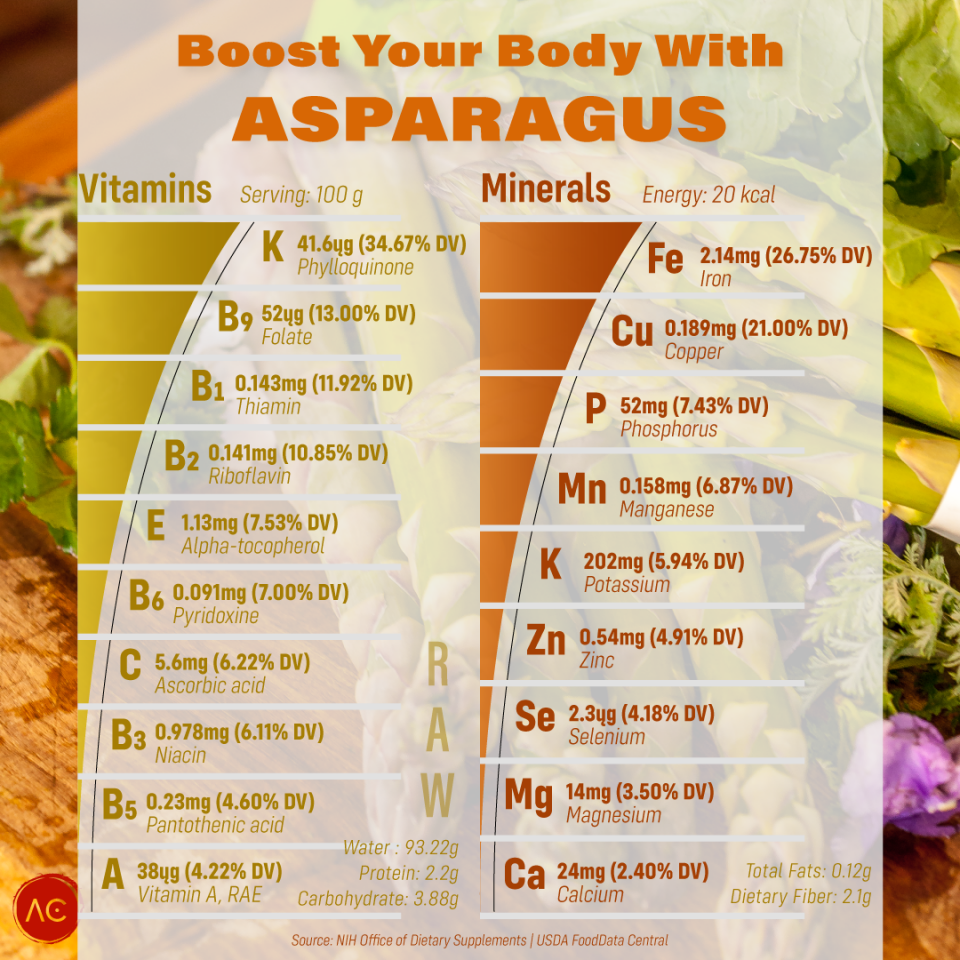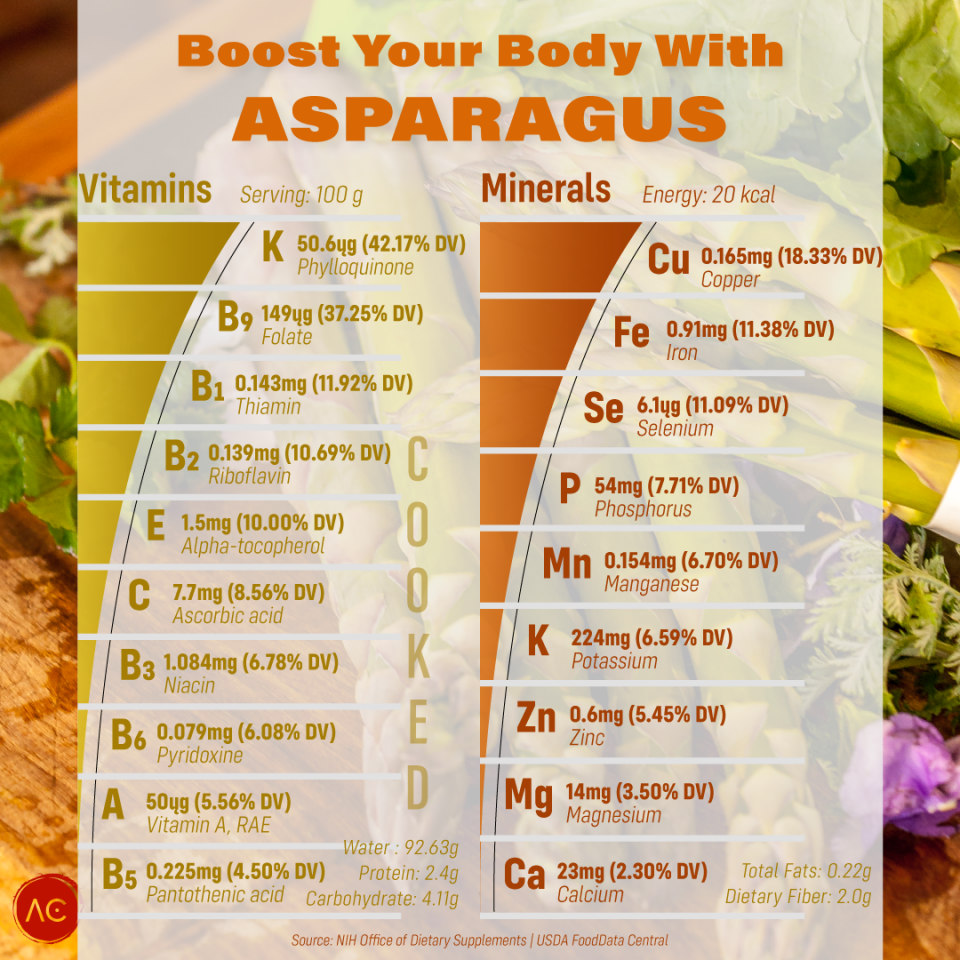Asparagus is reclaiming its position as a nutritional and medical powerhouse. Here is why.

Nature's Fountain of Youth
Asparagus - Packed with life giving potential
We are rediscovering the incredible power of natural foods. Asparagus is one of the oldest domesticated crops. At least 5000 years ago. Asparagus is reclaiming its position as a nutritional and medical powerhouse. Here is why.
Do you recall those moments when you were at your best? You felt the power of life flowing in your veins. You approached the day with relentless enthusiasm.
That same power exists in every asparagus shoot in its first days above ground. Why? Every young asparagus shoot was once on its way to becoming a small tree.
Eating young asparagus shoots this life potential transfers to us. Keeping us young. Helping us recover. Preventing disorders.
Asparagus helps with:
- Organ cleansing and toxin inhibitor via phytochemical action;
- Coping with stress via easily absorb-able B vitamins;
- Adrenal support via silica and trace minerals of iron, zinc and selenium; and
- Alkalizing the body via flushing out unproductive acids.
The above theme on asparagus is from Medical Medium® - Life Changing Foods
Super Foods Delivered to Your Door
Would you like to include power foods in your diet? The Africa Cuts service. Delivering Health to Your Door. Free delivery. Find out more.
Click the 'Apply Now' button.
Phytochemicals (plant chemicals) - Nature’s Antioxidant
Asparagus is abundant in Phytochemicals. Research shows that these plant chemicals protect us against disease.
Phytochemicals are the very way plants protect themselves against disease. This protection is passes on to us when we eat asparagus.
Phytochemicals act with powerful antioxidant activity. Protecting our cells from oxidative damage. This having the effect of reversing and protecting against many types of cancers.
Health Food Powerhouse Packed With Nutrition
Asparagus Medical Properties
Informative article on HerbaZest and Healthline discusses medical and nutritional properties of asparagus. The main active medical properties are glutathione and rutin.
Glutathione reduces oxidative stress. Oxidative stress is the imbalance between free radical production and fighting them off. Oxidative stress is a precursor to many diseases. Diabetes, cancer and rheumatoid arthritis.
Glutathione is essential for iron metabolism. Preventing illnesses related to iron deficiency.
Rutin has powerful antioxidant properties. It helps your body produce collagen. Collagen improves the cell connective tissue throughout the body. It helps our bodies use vitamin C.
Other health benefits cited on HerbaZest are:
- Encourage urine elimination. Alleviating water retention.
- Asparagus has high nutritional value. It has high soluble fiber content. These help suppress appetite and aid weight loss.
- Iron rich asparagus helps prevent anemia.
- Asparagus has oxidation properties and is nutrition rich. Thus asparagus reduces the risk of getting Alzheimer’s disease.
Asparagus Nutrition
Key vitamins:
- Vitamin K (phylloquinone) - promotes coagulation | improve bone mineral density
- Vitamin B9 (folate) - fetal development | new red blood cell generation | enhance iron absorption.
- Vitamin B1 (thiamin) - energy production | transform food to glucose
- Vitamin B2 (riboflavin) - prevent cellular damage | growth | red cell production
- Vitamin E (alpha-tocopherol) - supports immune system | blood clot prevention | cellular function
Key minerals:
- Copper - red blood cell production | bodily functions
- Selenium - cellular damage | thyroid hormone metabolism
Key nutrients, minerals and trace elements:
- Vitamin C (ascorbic acid)
- Vitamin B3 (niacin)
- Vitamin B5 (panthotenic acid)
- Vitamin B6 (pyroxidine)
- Vitamin A (as carotenoids)
- Choline, manganese, iron, potassium and zinc

It is interesting to note that cooked asparagus has a different nutrition composition.

10 Reasons why you Should Eat More Asparagus
This article on health.com gives 10 good reasons to eat more asparagus.
- Health benefits - beat bloat | loose weight
- Meet weight loss goals - low calories and high fiber
- Urinary tract health - natural diuretic via the action of amino acid asparagine
- Rich in antioxidants - fights damaging free radicals
- Contains vitamin E - strengthen immune system | protects cells
- Natural aphrodisiac - thanks to vitamin B6 and folate
- Hangover cure - minerals and amino acids protect liver from alcohol toxins
- Beat bloat - promote digestive health | encourages a balance of of good bactaria
- Rich source in folic acid - essential for women planning a pregnancy
- High in vitamin K - helps coagulation | assists bone health
A similar article on Healthline supports the many benefits of asparagus. Many nutrients and few calories. An excellent source of antioxidants. Improves digestive health. Supports a health pregnancy. Helps lower blood pressure. Helps loose weight. Easy to add to your diet.
How to Prepare Asparagus
Asparagus is easy to prepare. My favorite is to steam for 7 - 10 minutes. The stems are firm and give in to a finger squeeze. Delicious. You can also grill, roast, boil and sauté asparagus. The idea is NOT TO OVERCOOK.
You can also eat asparagus raw. Or juice it. The nutritional value of cooked asparagus is higher than raw.
A Spring Vegetable
Asparagus shoots in early spring. This is the best time to harvest and eat asparagus. Early season asparagus is the best. Later season may be a bit stringy and tough. Enjoy these shoots juiced into a green smoothie.
Super Foods Delivered to Your Door
Would you like to include power foods in your diet? The Africa Cuts service. Delivering Health to Your Door. Free delivery. Find out more.
Click the 'Apply Now' button.
References
The following articles were used as reference. Thank you.

Add new comment